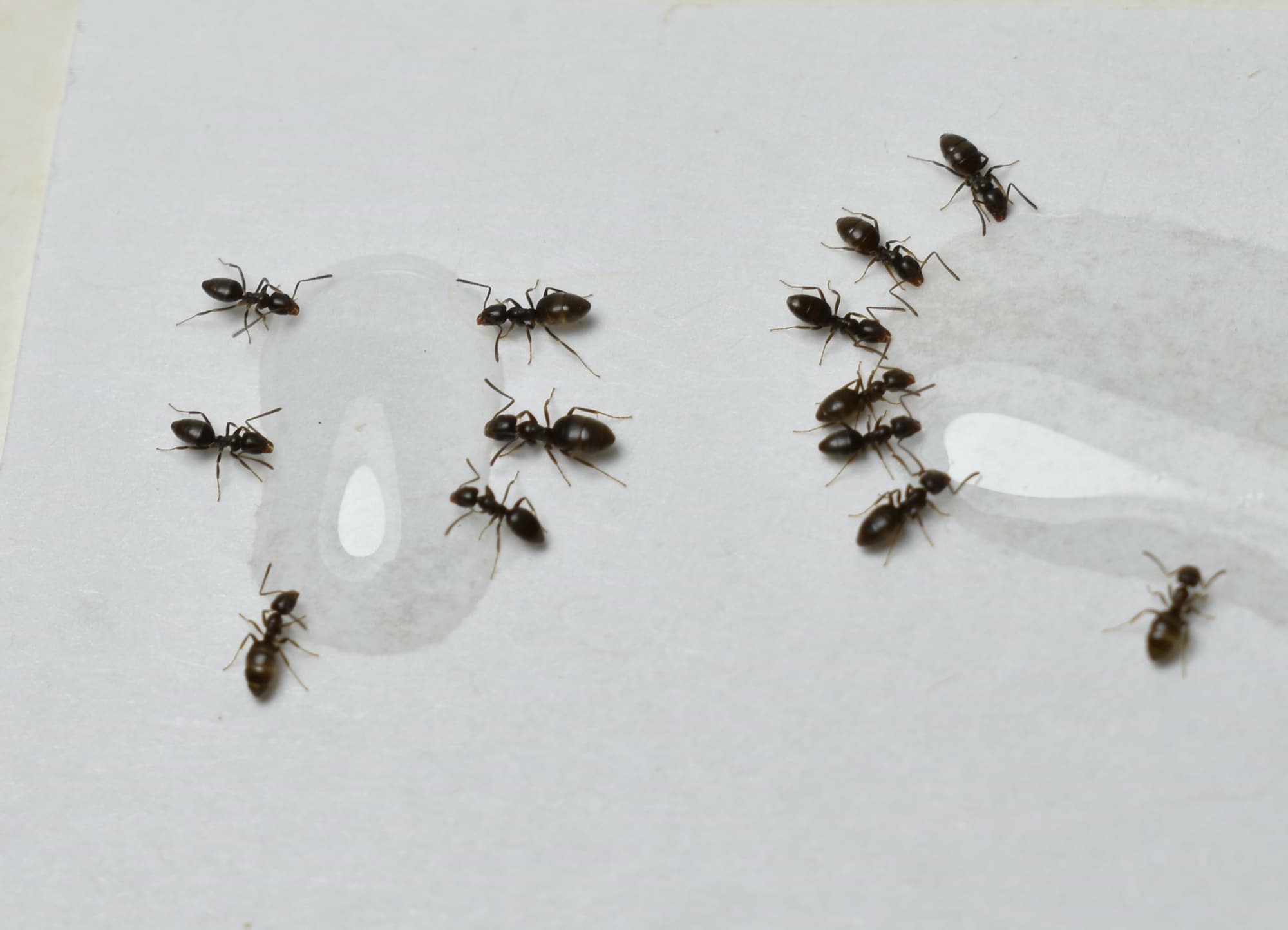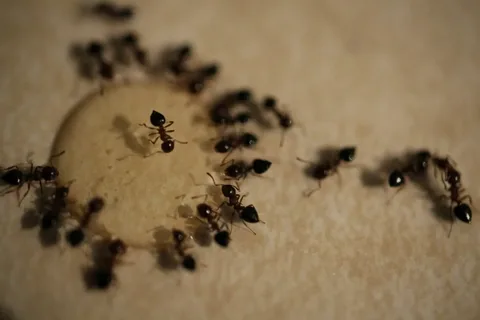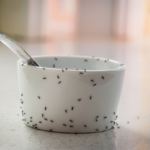Finding tiny black ants in your kitchen, bathroom, or other areas of your home can be frustrating.
While these small insects are usually harmless, their presence often signals a larger issue.
Little black ants are among the most common household pests, and once they find a food or water source, they can quickly invade your home in large numbers.
Fortunately, understanding their behavior and taking the right preventive measures can help you keep these pests at bay.
In this article, we’ll explore what little black ants are, why they invade homes, how to identify them, and most importantly, how to get rid of them and prevent future infestations.
What Are Little Black Ants?
Little black ants, also known as Monomorium minimum, are one of the most widespread ant species found in North American homes.
These ants are typically small, ranging from 1/16 to 1/8 inch in length, and are shiny black or dark brown in color.
They are often mistaken for other tiny ant species, but their distinctive behaviors and preferences can help you identify them more easily.
These ants are especially common in the summer months when they are most active, foraging for food to bring back to their nests.
While their small size makes them easy to overlook, a large colony of these ants can be a major nuisance.
They are drawn to sugary foods, greasy substances, and even pet food, making kitchens, pantries, and crumbs on floors prime targets.
Why Do Little Black Ants Enter Your Home?
Little black ants are constantly searching for food, water, and shelter. Your home offers all of these in abundance, making it an ideal location for these industrious pests.
Here are some common reasons why they may invade:
1. Food Sources
Ants are opportunistic feeders, and your kitchen is a perfect place for them to find something to eat.
Crumbs, spilled sugary drinks, or exposed food are all attractive to ants. Even a small amount of food left out overnight can invite an army of ants to march in.
2. Water Sources
Like all living creatures, ants need water to survive. Leaky pipes, standing water in sinks or bathtubs, or damp corners in the house provide an ideal environment for ants to find moisture.
3. Easy Access Points
Little black ants are skilled at finding tiny entry points into your home.
Cracks around windows, gaps in door frames, and openings around utility pipes or vents are all pathways they can use to get inside. Once they find an opening, they create trails to their food sources.
4. Nesting Opportunities
Ants often nest in hidden, dark areas, such as inside walls, under floors, or in cracks and crevices.
If your home provides suitable nesting sites, the ants may set up colonies inside, making it harder to locate the source of the infestation.
How to Identify Little Black Ants
Before you can take action, it’s important to know what you’re dealing with. Here’s how to identify little black ants:
- Size: Little black ants are very small, typically measuring 1/16 to 1/8 inch long. If the ants you see are larger or smaller, they may belong to a different species.
- Color: These ants are usually black, but some may appear dark brown or reddish.
- Behavior: Little black ants are social insects, so you’ll often see them in large numbers. They tend to form long, narrow trails as they forage for food and water, traveling in a straight line to and from their nests.
- Body Structure: These ants have a slender, smooth body with a noticeable petiole (the narrow waist segment between the thorax and abdomen). They may look similar to other tiny ant species, but their small size and shiny black color set them apart.
| Problem | Solution | Tip |
|---|---|---|
| Food Attraction | Clean up food sources and spills immediately | Wipe down counters, sweep floors, and store food in airtight containers. |
| Water Sources | Eliminate excess moisture and fix leaks | Dry wet areas, fix leaking faucets or pipes, and change damp towels. |
| Ant Entry Points | Seal cracks, gaps, and openings | Use caulk or weather stripping to seal cracks around doors, windows, and plumbing. |
| Finding the Ant Nest | Use ant baits or professional pest control | Place baits along ant trails; consult a pest control expert if the problem persists. |
| Persistent Infestation | Use insecticidal sprays or natural repellents | Use a non-toxic solution like vinegar or diatomaceous earth, or apply targeted sprays. |
| Preventing Future Infestations | Regular cleaning and maintenance | Clean your kitchen and bathrooms frequently, and inspect your home for entry points regularly. |
| Ant Trails | Disrupt scent trails and block their paths | Use a vinegar solution or cinnamon around trails to confuse and deter ants. |
| Nesting Inside Walls or Floors | Call a pest control professional | Professionals can locate and treat hidden nests within walls or under floors. |
| Pet Food or Pantry Issues | Store pet food and pantry items securely | Keep pet food sealed and pantry items in airtight containers. |
How to Get Rid of Little Black Ants
If you’ve noticed a trail of little black ants in your home, don’t panic. Here are some effective ways to control and eliminate them:
1. Cleanliness is Key
The first step in getting rid of ants is to eliminate the food and water sources that attract them.
Clean your kitchen thoroughly by wiping down counters, sweeping the floors, and disposing of crumbs or food scraps.
Be sure to clean behind appliances, as food can accumulate there unnoticed.
2. Seal Entry Points
Inspect the exterior and interior of your home for cracks, gaps, and other openings where ants might be getting in.
Seal these entry points with caulk, weather stripping, or other sealants. Pay particular attention to areas around windows, doors, pipes, and vents.
3. Use Ant Baits
Ant baits are one of the most effective ways to deal with little black ants.
These baits contain a slow-acting poison that the ants carry back to their colony, where it will be spread and eventually eliminate the queen and the entire nest.
Place the baits along ant trails or where you’ve seen the most activity.
4. Natural Remedies
If you prefer natural or non-toxic solutions, several home remedies can help deter or eliminate little black ants:
- Vinegar Solution: Mix equal parts water and white vinegar in a spray bottle. Spray it directly on ants or along their trails to disrupt their scent markers and repel them.
- Cinnamon: Ants dislike cinnamon, so sprinkling ground cinnamon along entry points or ant trails can help keep them away.
- Diatomaceous Earth: This natural substance can be sprinkled around areas where ants are entering your home. It acts as a desiccant, drying out the ants’ exoskeleton and killing them over time.
5. Insecticidal Sprays
If the infestation is severe, you may need to use insecticidal sprays designed for indoor use.
Look for products labeled as safe for use around food and pets, and always follow the manufacturer’s instructions carefully.
6. Call a Professional
If the problem persists or you are dealing with a large infestation, it may be time to call a pest control professional.
They can locate the nest, apply more effective treatments, and ensure the problem is fully eradicated.
Preventing Future Ant Infestations
Once you’ve dealt with the current ant problem, it’s essential to take steps to prevent future invasions.
Here are some tips for keeping little black ants out of your home:
1. Regular Cleaning
Keep your home tidy, especially in areas like the kitchen, pantry, and dining room.
Wipe down surfaces, vacuum up crumbs, and promptly clean up spills to eliminate food sources that may attract ants.
2. Store Food Properly
Store food in airtight containers and avoid leaving food out overnight. Make sure pet food is also kept in sealed containers to prevent attracting ants.
3. Seal Cracks and Gaps
Continue to inspect your home for potential entry points and seal any cracks or gaps.
This includes checking window screens, doors, and baseboards to ensure that ants can’t sneak in.
4. Keep Outdoor Areas Tidy
Trim back plants and bushes that are near your home’s exterior, as ants can use these as pathways into your house.
Clean up any organic debris, such as leaves and mulch, that might attract ants to your property.

Conclusion
While little black ants may seem like a minor nuisance at first, they can quickly become a bigger problem if not addressed.
By understanding their behavior, identifying the sources of attraction, and taking proactive steps to eliminate them, you can restore your home to its pest-free state.
Whether you choose DIY methods or call in a professional, the key to keeping ants out of your home is consistency, cleanliness, and vigilance.
With the right approach, you can enjoy an ant-free home once again.



